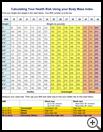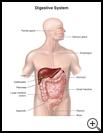
Obesity Surgery Discharge Information
What is obesity surgery?
Obesity surgery (also called bariatric surgery, gastric bypass surgery, metabolic surgery, or gastric restrictive surgery) is an operation that can help you lose weight when other treatments for severe obesity have not worked. Severe obesity is defined as being more than 100 pounds overweight or having a body mass index (BMI) of 40 or higher. The BMI is a measure of your weight in relation to your height.
The aim of obesity surgery is to change the gastrointestinal (GI) tract so it limits the amount of food you can eat. You will feel full more quickly when you eat, which means you will eat less.
Obesity surgery may be done if you have:
- BMI of 40 or more (severe obesity)
- BMI of 35 and an illness related to your obesity, such as diabetes, heart disease, or arthritis.
- Adjustable gastric banding may be recommended if your BMI is 30 or more and you have diabetes that is not well controlled, heart disease, or other health problems caused by obesity.
How can I take care of myself when I go home?
How long it takes to get better depends on the type of obesity surgery you have, how well you recover, your overall health, and any complications you may have.
Management
- Your provider will give you a list of your medicines when you leave the hospital.
- Know your medicines. Know what they look like, how much you should take each time, how often you should take them, and why you take each one.
- Take your medicines exactly as your provider tells you to.
- Carry a list of your medicines in your wallet or purse. Include any nonprescription medicines and supplements on the list.
- Talk to your provider before you use any other medicines, including nonprescription medicines.
- Your provider may prescribe medicine to:
- Treat pain
- Treat or prevent an infection
- Replace vitamins and minerals that your body is no longer able to absorb from the food that you eat
- Treat or prevent gas and bloating
- Your provider may recommend other types of therapy to help relieve pain, other symptoms, or side effects of treatment.
- To care for your surgical wound:
- Keep your wound clean.
- If you are told to change the dressing on your surgical wound, wash your hands before changing the dressing and after disposing of the dressing.
Appointments
- Follow your provider's instructions for follow-up appointments.
- Keep appointments for any testing you may need.
Talk with your provider about any questions or concerns you have.
Diet, Physical Activity, and Other Lifestyle Changes
- Follow the treatment plan your healthcare provider prescribes. Patients who do physical activities and follow their food plan for life have the best long-term results. You may have immediate problems and complications if you do not follow your food plan.
- Get plenty of rest while you’re recovering. Try to get at least 7 to 9 hours of sleep each night.
- Do physical activity as your provider recommends.
- Don't smoke. Smoking can delay healing.
- You will need to make changes in the foods you eat. You will work with your provider and a dietician to learn what you can eat, how much you can eat, and what you need in a healthy diet. Ask your healthcare provider if there are foods or medicines you should avoid.
- Find ways to make your life less stressful.
- Follow activity restrictions, such as not driving or operating machinery, as recommended by your healthcare provider or pharmacist, especially if you are taking pain medicines.
Call emergency medical services or 911 if you have new or worsening:
- Bowel movement with bright red blood
- Bright red blood in your vomit or vomit that looks like coffee grounds
Do not drive yourself if you have any of these symptoms.
Call your healthcare provider if you have new or worsening:
- Bloating, cramps, or pain in your belly
- Black, tarry bowel movements
- Nausea or vomiting
- Blood glucose higher or lower than the limits set by your provider
- Symptoms of dehydration, which may include dry mouth or eyes, weakness, little to no urine output
- Heartburn
- Dizziness or lightheadedness
- Change in bowel habits, such as pain, mucus, diarrhea, constipation
- Signs of infection around your surgical wound. These include:
- The area around your wound is more red or painful
- Your wound area is very warm to touch
- You have blood, pus, or other fluid coming from the wound area
- You have a fever higher than 101.5° F (38.6° C)
- You have chills or muscle aches
- Depression
Last modified: 2016-02-12
Last reviewed: 2016-07-15


